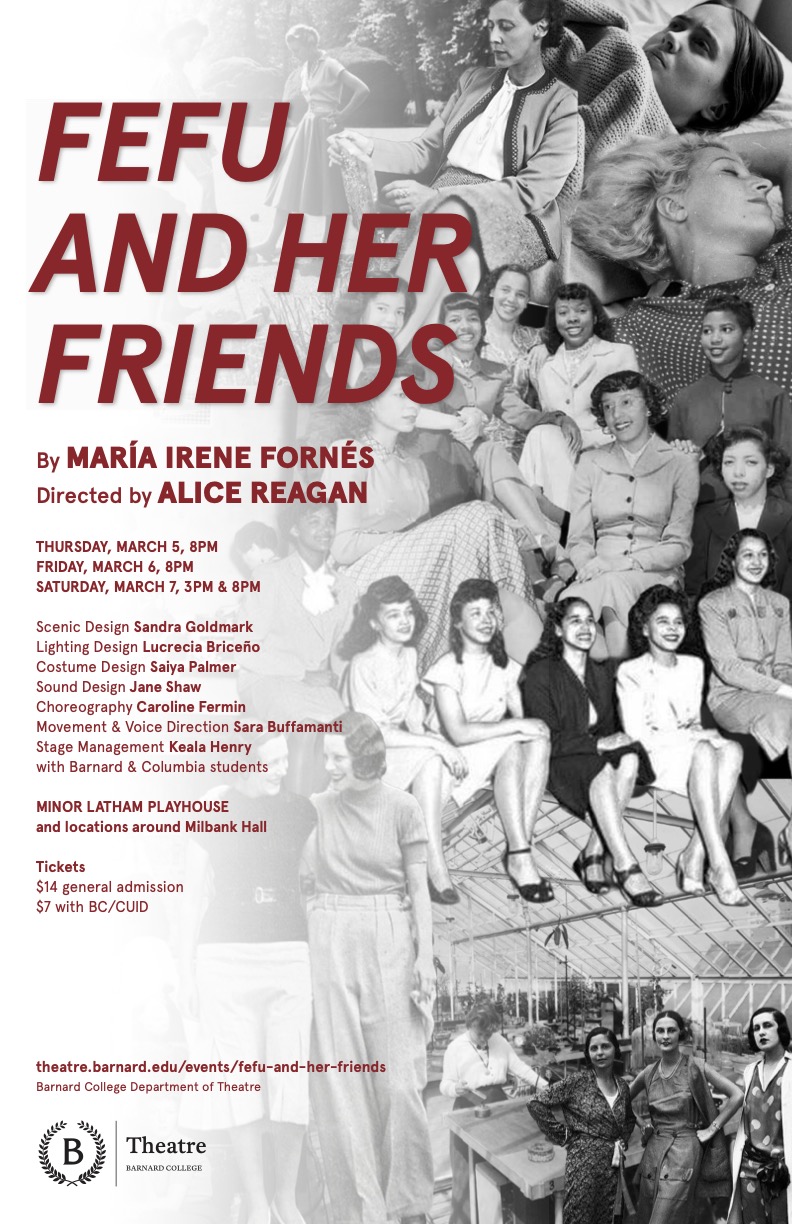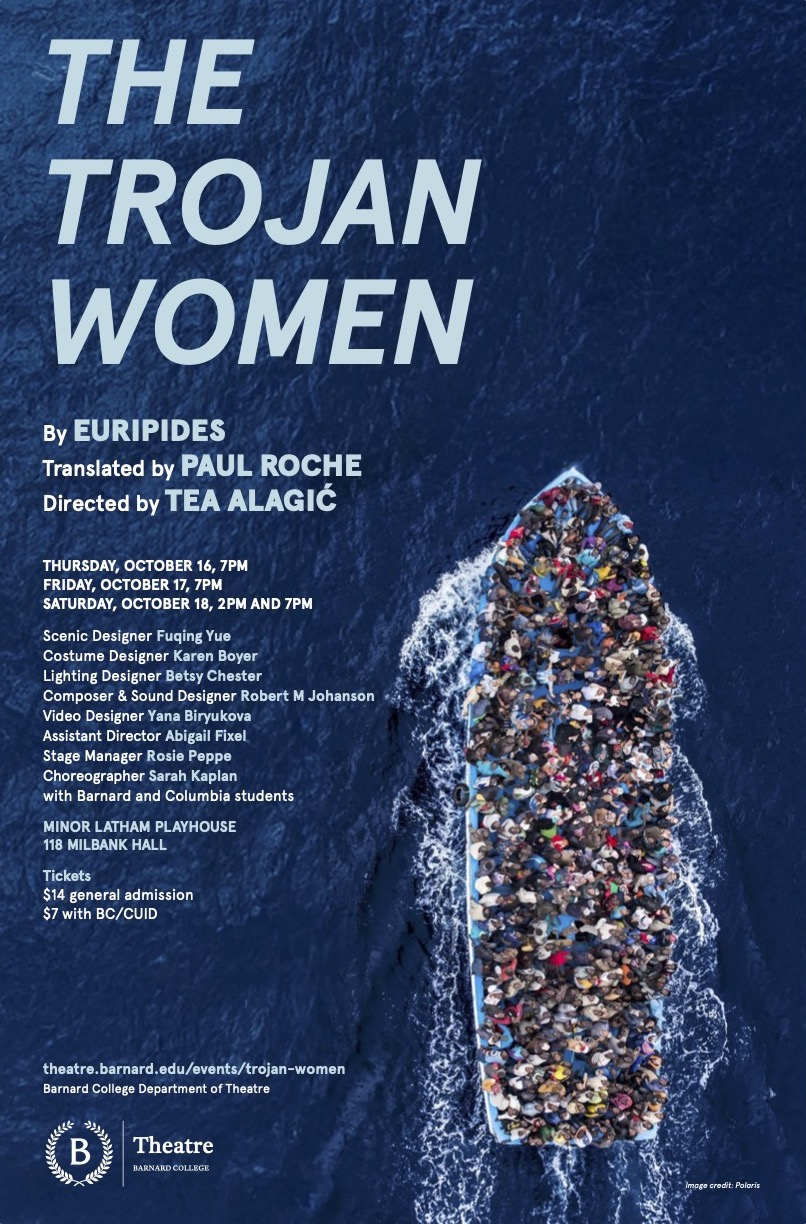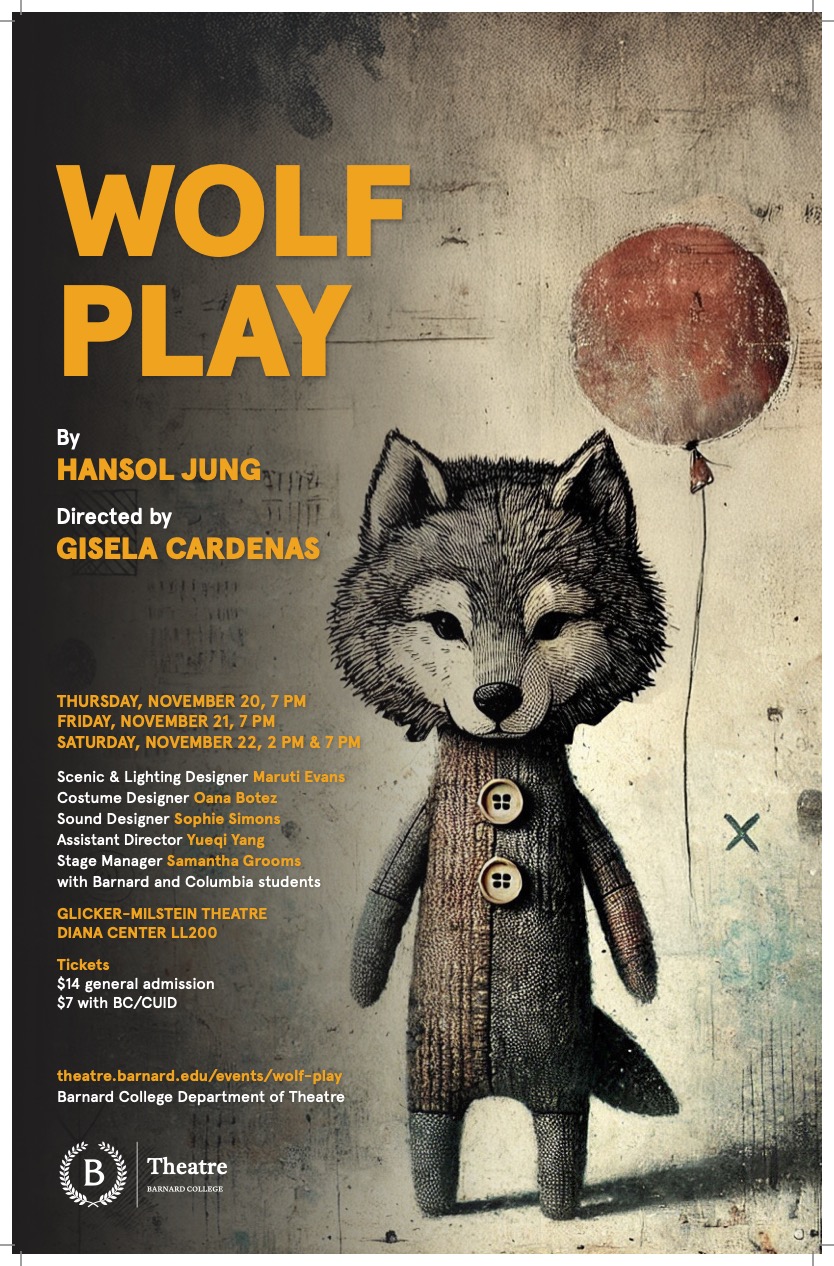Current Season (2025-2026)
Spring 2026

Fefu and Her Friends
by María Irene Fornés
Directed by Alice Reagan
Thursday, March 5, 8pm — TICKETS
Friday, March 6, 8pm — TICKETS
Saturday, March 7, 3pm — TICKETS
Saturday, March 7, 8pm — TICKETS
Minor Latham Playhouse (Milbank Hall 118)
Tickets:
$14 general admission
$7 with BC/CUID
Fefu and Her Friends Director's Statement
María Irene Fornés wrote and directed her masterpiece, Fefu and Her Friends, in downtown NYC in 1977. Fefu (a nickname for Stephany) gathers seven college friends to her spacious, comfortable home to plan a fundraiser for an educational initiative for elementary grades. Most or all of the women are educators. Most or all have been damaged by men and by the world that says they are less than (it’s 1935, and also, now). Many of the women have been assaulted physically, emotionally, psychologically. Over the course of the afternoon, they talk, argue, laugh, have a water fight, and come to some hard realizations about how far they’ve strayed from where they thought they would be in mid-life. It’s a deceptively simple play. But one of the women, Julia, has a mysterious injury. A dead rabbit turns up. And famously, Part II moves. After Act I, the audience is invited to abandon their seats in the auditorium and move to four different spaces in the building to view four short scenes happening on a loop. The audience then returns to the proper theatre space for Part III, where everything is the same, but different.
This production will take place in Minor Latham Playhouse and four locations in Milbank Hall: the Arthur Ross Greenhouse, Krueger Lecture Hall, the Ella Weed Room with its Tiffany fireplace, and room 328, a modern classroom. Milbank Hall is the oldest building on Barnard’s campus, and has seen strife in recent months, including protests and lock-downs. The fact that the offices of the administration are housed there make the building a site of unease. I won’t go so far as to say Fefu will heal the building or our community. It’s not a healing kind of play. But what Fefu does do is shed light on entrenched problems and show women trying to deal with them, as best they can, together. We will enliven every floor of Milbank, invite the whole community (including our neighbors) into these spaces and wake up everyone’s senses to the sometimes musty smells, colors, and textures of women’s education, which is still happening here. Fefu offers the possibility that we can reorient to the mission of Barnard. What is getting in our way?
—Alice Reagan, director
Please see here for content advisories.
Scenic Design Sandra Goldmark
Lighting Design Lucrecia Briceño
Costume Design Saiya Palmer
Sound Design Jane Shaw
Choreography Caroline Fermin
Movement & Voice Direction Sara Buffamanti
Assistant Directors Lyla Arazi and Nathan Rakolta
Stage Management Keala Henry
with Barnard and Columbia students: Emerson Antunes Black, Bess Blackburn, Zoë Chang, Isa Lilja-Vazquez, Shea Rodriguez, Margaret Townsend, Bella Williams, and Mimi Wu.
Thesis Festival I
Senior Thesis in Directing
April 23-25, 2026
The Insanity of Mary Girard
by Lanie Robertson
Directed by Abigail Fixel
A Cavalier for Milady
by Tennessee Williams
Directed by Melañia Horowitz
Thesis Festival II
Senior Thesis in Research, Playwriting, and Solo Performance
May 1 and 2, 2026
Fall 2025

The Trojan Women
by Euripides, translated by Paul Roche
Directed by Tea Alagić
October 16-18, 2025
The Trojan Women – Director’s Statement
The core of The Trojan Women revolves around the devastating aftermath of war: the fall of
Troy. As the women of Troy are captured by the Greeks, they grapple with loss, exile, and
uncertain futures. Our production at Barnard will be set in a modern-day, juvenile detention or
refugee center. We will draw a direct line between ancient suffering and the current refugee
crisis, particularly among young people.
The women of Troy are not only losing their homes but their autonomy, identities, and futures.
In modern refugee crises, young people often experience similar displacements—losing not
only their homes but also their families, communities, and safety. A refugee camp or juvenile
detention facility serves as a modern-day version of this liminal space where these young
individuals have no control over their fate. The allegory is powerful: both the Trojans and
modern refugees are victimized by forces far beyond their control (war, geopolitical conflict,
systemic violence).
In The Trojan Women, the majority of the characters are women, and their grief is both
individual and collective. This is echoed in the experiences of young women refugees or
detainees, who often bear the brunt of sexual violence, loss of family, and trauma. This context
will allow us to explore the gendered dimensions of grief, as well as the solidarity that can
emerge among women facing similar fates. Contemporary refugee narratives often emphasize
the resilience of women, and this theme can be drawn out in the chorus, where each member
represents the grief of an individual while collectively embodying the suffering of all displaced
people.

Wolf Play
by Hansol Jung
Directed by Gisela Cardenas
November 20-22, 2025
Wolf Play Director's Statement
Jeenu, a young Korean boy initially adopted by a couple and then re-homed online to a new family, is wild, untamed, and determined to survive in a world that uses and discards him like an object. He brings chaos into his new home, but also a “rewirement” of the idea of belonging and the meaning of finding your pack.
We often like to believe that family is the last refuge of intimacy, a place where a child is protected from the brutal logic of the market. However, Wolf Play confronts us with the obscenity of this belief. At the beginning of the play, the child is literally treated as a commodity on the Internet, as if Amazon now offered next-day delivery of human souls. The boy, imagining himself as a wolf, acts out the animality that our polite symbolic order tries to tame. He breaks through –claws and all— to shatter his new family’s ideals, who are themselves attempting to rewire traditional notions of family and identity.
Wolf Play invites us to examine accepted ways of understanding identity, family, masculinity, and community. In this play, those who question heteronormative and patriarchal lenses carry the stigma of being othered –seen as wild creatures who must fight, whether in a real boxing ring or at court, to have the right to find their pack in this world.
This play explores the animal side within all of us. On one side, the fiery nature of those who refuse to be tamed and strive to create a more open world; on the other, the darker instincts of self-centered individuals who exploit more vulnerable subjects, treating them as objects, and stripping our world of its soul.
I once heard the phrase that a parent does not own a child but only guards the child’s soul. Wolf Play extends this idea beyond genetics and into adoptive parenthood. Robin and Ash –the nonbinary couple fighting their way into a binary world— become Jeenu’s soul-guardians: three wolves, one pack.
-- Gisela Cardenas, Director